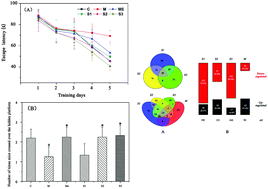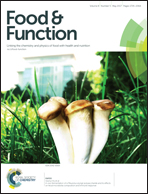Dietary krill oil enhances neurocognitive functions and modulates proteomic changes in brain tissues of d-galactose induced aging mice
Abstract
The effects of dietary krill oil on neurocognitive functions and proteomic changes in brain tissues of D-galactose-induced aging mice were evaluated. Dietary krill oil enhanced the neurocognitive functions of aging mice with a significant (P < 0.05) decrease in escape latency and an increase in the number of times of crossing over the hidden platform during the Morris water maze test. Krill oil was also found to protect against oxidative damage, lipid peroxidation and neurodegenerative diseases. Oxidative stress biomarkers of aging mice administered with krill oil showed significant (P < 0.05) improvement with an increase in serum superoxide dismutase (SOD) and glutathione peroxidase (GSH-Px) levels; there were insignificant changes in the serum malondialdehyde (MDA) level. In terms of proteomic changes, krill oil resulted in upregulation of the Celsr3 and Ppp1r1b gene expression, which contribute to brain development, learning and memory behavior processes. In particular, the Ppp1r1b gene is associated with the inhibition of dopamine releases, which decreases the motivation for learning.



 Please wait while we load your content...
Please wait while we load your content...